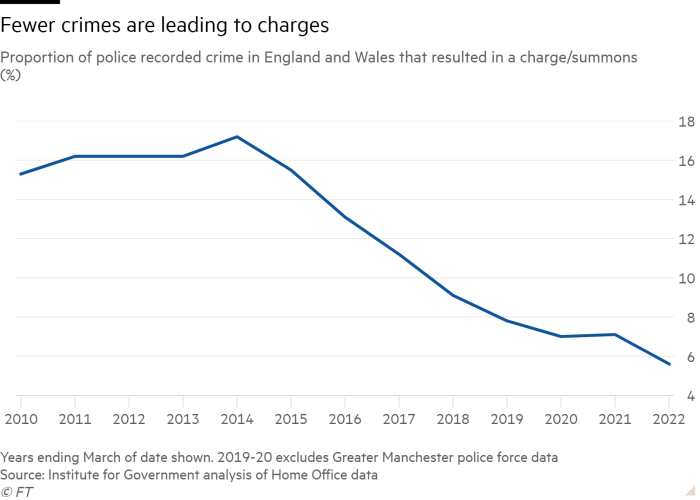The UK’s crisis-hit public services will not recover before the next election and may require significant injections of cash to prevent further decline, according to a sobering annual review by the Institute for Government, a non-partisan think-tank.
After almost 13 years of austerity and grave damage to the public sector’s capacity as a result of the pandemic, the IfG report said “it is unclear whether the government will find existing funding levels to be politically sustainable in the run-up to the next election”, which must be called by the end of 2024.
It added: “The situation will be even harder for whoever forms the next government.”
The authors forecast that, based on current policy, “hospital waiting times and lists will remain above where they were in 2019, pupils will not catch up on lost learning, and the social care provider market will not be put on a sustainable long-term financial footing . . . The situation in prisons and courts is arguably worse.”
While increases in budgets already announced at the Autumn Statement in November should allow hospitals, GP practices, schools and local government services to avoid real-terms cuts for the rest of this parliament, the cost of higher pay that may be awarded to end the recent strikes would require offsetting cuts in non-payroll budgets.
The report also concludes that the current budget “does not provide the level of funding required for major improvements to performance”.
There is room for some help: this week, Jeremy Hunt, chancellor of the exchequer, learned that the public finances had more short-term slack than expected, with the level of borrowing so far in this financial year running about £30bn lower than forecast.
The state of the NHS has been named as a major issue for voters. In one recent poll by Redfield and Wilton, for example, more than half of respondents said it was one of their top three concerns — behind only the economy.
The IfG noted that the number of people on waiting lists for treatment is now around 7.2mn — more than one in eight people in England. At the start of the pandemic, the equivalent figure was 4.4mn. The number of people waiting at least a year for their treatment, which stood at 3,300 in March 2020, is around 400,000.
A core problem in fighting this backlog is that the health service is still not operating at the same speed as it did prior to the pandemic. For example, the number of diagnostic tests each month has still not returned to pre-2020 levels. The number of patients now waiting long spells for tests, an extreme rarity before the pandemic, is growing.

Stuart Hoddinott, a researcher at the IfG, traced a lot of these problems to the 13 years of austerity since the financial crisis. “Our testing capacity is massively limited by the lack of capital investment over the past decade,” he said.
“Yes, the pandemic has had an outsized impact. But you can see big declines across NHS performance through the 2010s. It lacked resilience when it started,” he added.
Some of the NHS’s problems stem from issues in the social care system, which is largely funded by cash-strapped local authorities that have had their own funding slashed by central government.
The service itself is overwhelmed. During the pandemic, requests for care declined — but only temporarily. And the sector, which tends to pay less than the NHS, is struggling to recruit and retain staff.
As a result the care system has struggled, leaving people who should be in care stranded in hospitals. This week, NHS England said that at one point this winter over 14,000 hospital beds were being taken up by patients medically fit for discharge.

The IfG noted: “The workforce crisis that briefly eased during the first year of the pandemic is now worse than ever, with 50,000 fewer posts in the social care workforce filled in March 2022 than at the same point the year before, and the highest vacancy rate on record.”
The authors pointed to analogous problems in other parts of the state. Staffing is a serious problem in schools: adjusted for subject mix, the number of teachers required to be trained in England in 2022-23 was 44 per cent below target. England recruited just 17 per cent of its target number of trainee physics teachers.
The IfG estimated that the government is also likely to fall short in its drive to recruit 20,000 new police officers.
Of far greater concern, however, is the performance of the justice system. The share of reported crimes in England and Wales that result in a charge has fallen from 17.2 per cent in 2013-14 to 5.6 per cent in 2021-22.

This has led to a pronounced decline in cases referred to courts — and yet the court and prison system are overwhelmed. The report notes: “progress in addressing the crown court backlog will be slow and the prison service will find it very difficult to safely house the expected increase in prisoner numbers.”
Angela Rayner, deputy leader of the Labour party, described the report as a “damning verdict on 13 years of Tory mismanagement” of Britain’s public services.
“The Tories’ failure to get a grip and resolve disputes has added insult to injury after a decade of failure to tackle the cost of living crisis,” she said. “While the Tories manage decline and bask in their failure, only Labour has a concrete plan for national renewal underpinned by growth.”
A government spokesperson said: “At the last Autumn Statement, we set out how we would protect our vital public services. We prioritised further investment with up to £14.1bn available for the NHS and social care, an additional £2.3bn a year for schools and we’re also giving policing an additional £1.1bn billion to tackle crime in the worst-affected areas.”

